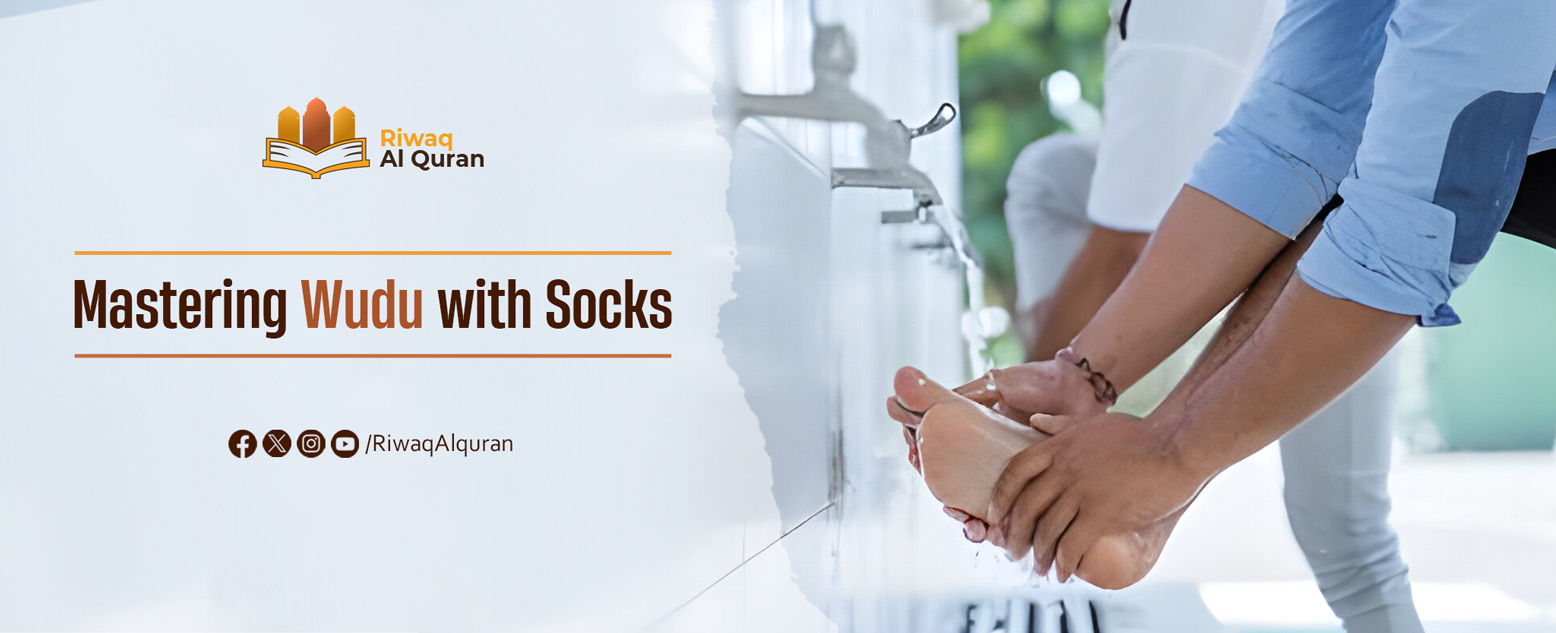The practice of wiping over socks (Masah over Khuff) allows Muslims to maintain ritual purity by wiping over socks instead of washing the feet during Wudu. The socks must be made of impermeable material, cover the ankles completely, and be free from significant holes. It is valid for 24 hours for residents and 72 hours for travelers.
Wudu is a fundamental part of a Muslim’s daily ritual, performed before prayers to ensure physical and spiritual cleanliness.
But let’s face it, sometimes washing the feet directly can be a bit challenging, especially in cold weather or when you’re on the move. Enter the concept of “Wudu with socks,” a practice that brings a touch of convenience without compromising on religious obligations.
This article delves into the intricacies of this practice, explaining its conditions, methods, and benefits. So, if you’ve ever wondered about the ease and flexibility of performing Wudu with socks, read on!
Table of Contents
What is Wudu with Socks?
Masah refers to wiping over a surface with a wet hand. In the context of wudu, it means wiping over the socks instead of washing the feet. The socks, known as “khuff” in traditional terms, must meet specific criteria to be eligible for masah.
Conditions for Wudu with Socks:
When performing Wudu steps (ablution) with socks, also known as Masah over Khuffain, specific conditions must be met to ensure the validity of the ablution. Here are the essential conditions:
– The socks should be made of a material that prevents water from seeping through, such as leather or thick fabric.
– They must cover the foot up to the ankle completely.
– The socks should be free of significant holes and must not expose any part of the foot that needs to be washed in wudu.


How to Perform Wudu with Socks?
Performing Wudu (ablution) with socks, known as Masah over Khuffain, allows Muslims to maintain cleanliness without removing their socks. This practice is particularly useful in cold weather or while traveling. Here’s a step-by-step guide on how to perform Wudu with socks:
1. Begin with the Intention (Niyyah):
As with all acts of worship, start with the intention to perform wudu for the sake of Allah.
2. Do The Steps of Wudu
Follow the steps of wudu as you normally would, up to the point of washing the feet.
3. Wipe over you socks instead of washing:
Instead of washing the feet, wet your hands and wipe over the top of each sock. Start from the toes and move towards the ankle. One wipe over each sock is sufficient.
Duration in Wudu Over Socks:
For residents, Wudu over socks is valid for 24 hours.
For travelers, it is valid for 72 hours.
Evidence from The Sunnah About wiping over socks:
The practice of Wudu over socks is well-supported by the Sunnah. Various hadiths illustrate the Prophet Muhammad (PBUH) and his companions performing and permitting Wudu over khuff.
Hadith Example: One well-known hadith narrated by Al-Mughira ibn Shu’ba states:
“I was with the Prophet (PBUH) on a journey and I moved to take off his khuff. He said, ‘Leave them, for I put them on while I was in a state of purity,’ and he wiped over them.” (Sahih Muslim)
Types of Accepted Socks:
When performing Wudu with socks, it is important to understand the types of socks that are permissible for Masah (wiping). Some specific requirements and types are generally accepted according to Islamic jurisprudence. Here are the main types:
- Socks (Khuff): Universally accepted across all major Islamic schools of thought.
- Fabric Socks: Some scholars accept wiping over thick fabric socks, while others insist they must be waterproof or similar to khuff.
Conditions for the socks / Khuff on which wiping is permitted:
When it comes to performing Wudu with socks (Khuffain), there are specific conditions that must be met to ensure the validity of wiping over them. Here are the essential conditions:
Material: Scholars debate whether the socks need to be impermeable or if regular socks suffice.
Holes and Tears: Some schools allow small holes in socks, while others require them to be intact.
Specific School Opinions:
When it comes to the permissibility and conditions of performing Wudu (ablution) with socks or Khuffain, Islamic jurisprudence offers various opinions based on the different schools of thought. Here’s a summary of specific school opinions on the matter:
- Hanafi: Allows wiping over thick, ordinary socks that do not let water seep through.
- Maliki and Shafi’i: More stringent, typically requiring socks to be similar to khuff in their impermeability.
- Hanbali: Allows wiping over any type of sock as long as it covers the area required in wudu.
The disagreements stem from interpretations of hadith and traditional practices, with each school providing evidence for its stance. Despite these differences, the practice aims to provide ease and convenience in maintaining ritual purity.
Experience Riwaq Al Quran Classes
Watch real moments from our live sessions at Riwaq Al Quran and see how we bring learning to life. These clips highlight our interactive, student-focused approach designed to keep learners engaged, motivated, and actively involved in every step of their educational journey.
Common mistakes when wiping over socks / khuff and how to avoid them:
At performing Wudu with socks or Khuff, several common mistakes can invalidate the ablution. Here’s the most important on these common mistakes and how to avoid them:
1. Incorrect Material:
Ensure the socks are made of a permissible material that does not allow water to seep through easily.
2. Incomplete Coverage:
The socks must cover the entire foot, including the ankles. Partial coverage invalidates the masah.
3. Duration Mismanagement:
Remember the time limits: 24 hours for residents and 72 hours for travelers. Exceeding these limits requires a new wudu with washing the feet.
4. Improper Wiping:
Wiping should be done over the top surface of the socks, not the bottom or sides. Use the hands to perform a single, smooth motion from toes to ankles.
Can I perform wudu over regular cotton socks?
Generally, regular thin cotton socks are not considered sufficient for masah. The socks should be thick enough to cover the feet completely and prevent water from seeping through.
What if my socks have small holes?
Minor holes that do not expose significant parts of the feet might be overlooked, but ideally, the socks should be intact and cover the feet fully.
Is wudu over socks valid for both men and women?
Yes, the rules for wudu over socks apply equally to both men and women.
Can I perform wudu over socks more than once a day?
Yes, as long as the duration (24 hours for residents and 72 hours for travelers) has not expired, you can perform Masah over the socks multiple times.


Why Students Love Learning with Riwaq Al Quran
Hear directly from our students about how Riwaq Al Quran Academy has transformed their connection with the Book of Allah. Their experiences reflect the dedication, care, and quality that guide every step of our teaching.
Learn Quran, Arabic And Islamic Studies Online With The Best Native Tutors
Riwaq Al Quran is a comprehensive online platform that offers personalized Quran, Arabic and Islamic Studies Online classes for individuals of all ages and backgrounds.
Their experienced instructors use a structured curriculum to cover Tajweed, Tafsir, and Memorization, providing easy and effective access to learning the Quran.
The advanced online classes allow for seamless communication and interaction between students and teachers. Join Riwaq Al Quran for a deeper connection with the Quran.
We offer several courses such as:
- Online courses for kids.
- Online Quran classes for kids and adults.
- Online Arabic courses
- Online Ijazah courses
- Online Islamic Studies courses.
Here are a sample of our set of Quran Courses that will be helpful for you:
- Online Tafseer Course: Delve into Quranic meanings with our insightful online Tafseer course.
- Noorani Qaida Online: Learn Quranic basics efficiently through our Noorani Qaida online program.
- Online Quran Recitation Course: Enhance Quranic recitation skills through our expert-led online course.
- Online Tajweed Classes: Master Tajweed rules for beautiful Quranic recitation in online classes.
- Quran Memorization Online Course: Memorize the Quran effectively with our specialized online memorization course.
- Online Qirat Course: Explore diverse Qirat styles with our comprehensive online Qirat course.
- Online Quran Classes for Kids: Nurture a love for the Quran in kids through interactive online classes.
Conclusion
The practice of wiping over socks, known as Masah over Khuff, is deeply rooted in the Sunnah. The Prophet Muhammad (PBUH) often performed Masah over his Khuff, demonstrating its permissibility and practicality. This act is supported by numerous Hadiths, such as the narration from Al-Mughira ibn Shu’ba, who observed the Prophet performing Masah over his leather socks during Wudu.
Islamic jurisprudence emphasizes ease and flexibility, particularly in maintaining cleanliness and readiness for prayer. Masah over Khuff exemplifies this leniency, allowing Muslims to maintain ritual purity without hardship. Scholars urge the adoption of this practice as it aligns with the Prophet’s example, ensuring that religious obligations are fulfilled conveniently, especially in situations where removing shoes and washing feet may be challenging.
By embracing the practice of Wudu with socks, Muslims can uphold their religious duties with greater ease and convenience, reflecting the practical and compassionate spirit of Islam.


































